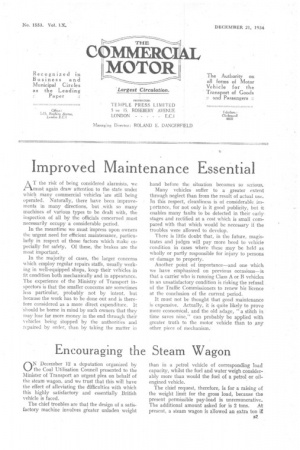Improved Maintenance Essential
Page 21

If you've noticed an error in this article please click here to report it so we can fix it.
AT the risk of being considered alarmists, we must again draw attention to the state under which many commercial vehicles are still being operated. Naturally, there have been improvernents in many directions, but with so many machines of various types to be dealt with, the inspection of all by the officials concerned must necessarily occupy a considerable period.
In the meantime we must impress upon owners the urgent need for efficient maintenance, particularly in respect of those factors which make especially for safety. Of these, the brakes are the most important.
In the majority of cases, the larger concerns which employ regular repairs staffs, usually working in well-equipped shops, keep their vehicles in fit condition both mechanically and in appearance. The experience of the Ministry of Transport inspectors is that the smaller concerns are sometimes less particular, probably not by intent, but because the work has to be done out and is therefore considered as a more direct expenditure. It 'should be borne in mind by such owners that they may lose far more money in the end through their vehicles being Stopped by the authorities and repaired by order, than by taking the matter in hand before the situation becomes so serious.
Many vehicles suffer to a greater extent through neglect than from the result of actual use. In this respect, cleanliness is of considerable importance, for not only is it good publicity, but it enables many faults to be detected in their early, stages and rectified at a cost which is small comparedwith that which would be necessary if the troubles were allowed to develop.
There is little doubt that, in the future, magistrates and judges will pay more heed to vehicle condition in cases where these may be held as wholly or partly responsible for injury to persons or damage to property.
Another point of importance—and one which we have emphasized on previous occasions—is that a carrier who is running Class A or B vehicles in an unsatisfactory condition is risking the refusal of the Traffic Commissioners to renew his licence at the conclusion of the current period.
It must not be thought that good maintenance is expensive. Actually, it is quite likely to prove more economical, and the old adage, "a stitch in time saves nine," can probably be applied with greater truth to the motor vehicle than to any other piece of Mechanism.




























































































